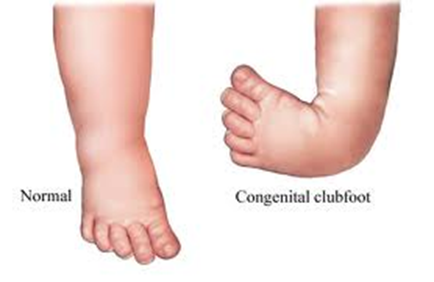A nurse is planning care for an infant who has congenital talipes equinovarus. Which of the following referrals should the nurse expect the provider to make?
Ophthalmologist
Nutrition counselor
Speech therapist
Orthopedic specialist
The Correct Answer is D
A. Ophthalmologist: This healthcare professional specializes in the diagnosis and treatment of eye disorders. While eye problems can occur in infants, congenital talipes equinovarus specifically involves foot deformities rather than eye issues. Therefore, a referral to an ophthalmologist wouldn't be appropriate for this condition.
B. Nutrition counselor: A nutrition counselor provides guidance on diet and nutrition-related issues. While nutrition is essential for overall health, it's not directly related to the treatment of congenital talipes equinovarus. Therefore, a referral to a nutrition counselor wouldn't typically be part of the care plan for this condition.
C. Speech therapist: Speech therapists, also known as speech-language pathologists, specialize in evaluating and treating communication and swallowing disorders. However, congenital talipes equinovarus doesn't affect speech or swallowing. Therefore, a referral to a speech therapist wouldn't be relevant for this condition.
D. Orthopedic specialist: An orthopedic specialist is a healthcare professional who specializes in the diagnosis and treatment of musculoskeletal conditions, including congenital abnormalities like clubfoot. They are trained to assess the severity of the deformity and develop a treatment plan, which may include non-surgical or surgical interventions to correct the foot alignment. Therefore, a referral to an orthopedic specialist is the most appropriate choice for an infant with congenital talipes equinovarus.

Nursing Test Bank
Naxlex Comprehensive Predictor Exams
Related Questions
Correct Answer is D
Explanation
A. Green zone reading on peak expiratory flow meter:
A green zone reading on a peak expiratory flow meter indicates that the child's peak expiratory flow rate (PEFR) is within the normal or stable range. This would not typically be indicative of an exacerbation of asthma. In fact, a green zone reading suggests that asthma is well-controlled.
B. Rhinitis:
Rhinitis, or inflammation of the nasal mucosa, is a common symptom in individuals with asthma, but it is not necessarily indicative of an exacerbation of asthma. Rhinitis can occur due to allergic or non-allergic triggers and may be present even when asthma is well-controlled.
C. Axillary temperature of 37.2°C (99°F):
An axillary temperature of 37.2°C (99°F) is within the normal range for body temperature and is not indicative of an exacerbation of asthma. While fever can occur during exacerbations of asthma, it is not a universal symptom and may be absent in some cases.
D. Hacking, nonproductive cough:
This is the correct option. A hacking, nonproductive cough is a common symptom of asthma exacerbation. During an exacerbation, the airways become inflamed and constricted, leading to coughing. The cough may be dry and unproductive, and it is often worse at night or early in the morning.
Correct Answer is C
Explanation
A. "Monitor your child for excessive sleepiness."
Methylphenidate is a central nervous system stimulant used to treat attention deficit hyperactivity disorder (ADHD). It typically causes insomnia or decreased need for sleep rather than excessive sleepiness. This option is incorrect, as it does not align with the expected side effects of the medication.
B. "Administer the medication with a caffeinated beverage."
Caffeine is also a stimulant, and combining it with methylphenidate could increase the risk of side effects such as increased heart rate, anxiety, or jitteriness. This instruction is incorrect and unsafe.
C. "Administer the second dose of the medication at lunch time."
Methylphenidate is usually given in divided doses, with the second dose often administered at lunchtime. This timing helps maintain therapeutic levels during the school day while minimizing the risk of insomnia. This option is correct and appropriate for managing the medication.
D. "Monitor your child for weight gain."
A common side effect of methylphenidate is appetite suppression, which can lead to weight loss, not weight gain. This option is incorrect, as the nurse should instruct the parent to monitor for weight loss instead.
Whether you are a student looking to ace your exams or a practicing nurse seeking to enhance your expertise , our nursing education contents will empower you with the confidence and competence to make a difference in the lives of patients and become a respected leader in the healthcare field.
Visit Naxlex, invest in your future and unlock endless possibilities with our unparalleled nursing education contents today
Report Wrong Answer on the Current Question
Do you disagree with the answer? If yes, what is your expected answer? Explain.
Kindly be descriptive with the issue you are facing.
